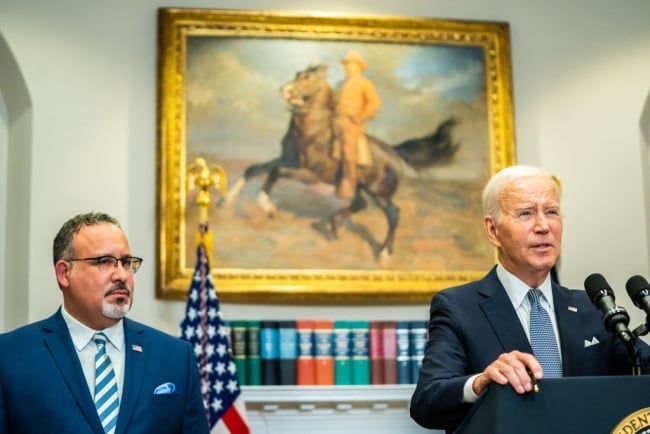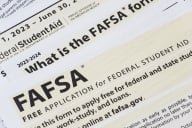You have /5 articles left.
Sign up for a free account or log in.

The Biden administration pushed off a reporting deadline related to its new gainful employment rule after colleges said they needed more time.
Demetrius Freeman/The Washington Post/Getty Images
The Education Department said Friday it will push back the reporting requirements for its new gainful employment and financial value transparency rule (FVT/GE) from July 31 to Oct. 1.
Under the rule, colleges and universities will have to report new program-level information, including the total cost of attendance and the amount of private education loans disbursed to students. They’ve argued in letters to the department that it’s too much, too soon, largely because they need to focus on processing student aid applications and sending out award letters. Institutions have had less time this year than usual because of the fraught roll-out of the new Free Application for Federal Student Aid, which has faced myriad delays and technical issues.
In February, the department relaxed a number of other administrative requirements for colleges and universities because of the FAFSA issues. But delaying the gainful employment deadline was a top priority for institutions given the work involved to gather and submit the data. The department has estimated that complying with reporting requirements will take up about 5 million hours across 4,518 institutions.
“This adjusted timeline allows institutions to focus their efforts on getting aid to students this spring and to have more time to compile data that would otherwise have been required by the end of July,” the department said in its announcement, which didn’t specifically mention the issues surrounding the new FAFSA.
The gainful employment and financial value transparency rule, which will take effect July 1, aims to give prospective students and their families better information about college programs, including whether graduates can afford their yearly debt payments and whether they earn more than an adult in their state who didn’t go to college.
Programs at for-profit colleges, as well as nondegree programs in any sector, could lose access to federal financial aid if they fail either of those tests. When other programs fail, the department will notify students and families that those academic offerings could lead to adverse financial consequences via a website that is set to launch by July 2026. For graduate degree and certificate programs that flunk the debt-to-earnings test, students will have to sign a form acknowledging they’ve seen the data before they can enroll.
“The department recognizes that effectively launching the FVT/GE regulations means giving institutions the time needed to compile the necessary data for reporting, while also carrying out their other responsibilities,” the announcement said.
Following Friday’s announcement, colleges can start reporting the information in July, with all the required data due by Oct. 1. Despite the reporting delay, the department is sticking with its plan to publish the first round of gainful employment and financial value transparency metrics—and notify institutions that have failing programs—in early 2025 and launch its website to publicize the financial-value information about all programs the following year.
Along with the FAFSA challenges, colleges have also been saying they need more information about how exactly to comply with the gainful reporting requirements. The department provided some of those details in Friday’s announcement, and a subsequent Dear Colleague letter outlined a plan to provide further guidance. A “frequently asked questions” page on the regulation will be published next week, and the department will host a webinar in July about the reporting process.
Emmanual Guillory, senior director of government relations at the American Council on Education—which called for a delay—welcomed the department’s decision to roll back the deadline. But he questioned whether the extra time will be sufficient, either for colleges or for the Education Department.
“We know that they’re doing what they can to make the best of a sticky situation,” Guillory said. “We’re happy they’re being flexible for institutions, but there’s still a reduced window of time that institutions will have. Given everything on the [department’s] plate, this still seems ambitious.”








